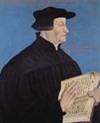
Ulrich Zwingli

Zacharias Ursinus

Caspar Oevianus
Our Larger Heritage
The United Church of Christ is relatively young and partly for this reason relatively unfamiliar. The new church resulted from the merger of two historic American denominations (the Evangelical and Reformed and the Congregational Christian Churches), both of which had much in common.
The new denomination was born from these two mature parent bodies June 25-27, 1957. It was, as the dates indicated, a slow delivery, but a successful and happy one nevertheless.
Both branches of the United Church of Christ go back to the initial Protestant movement. Of the two Evangelical and Reformed Churchs had an older history, but not by much. The roots of the E&R Church trace to the 16th century in Europe. About the time Martin Luther nailed his 95 thesies to the church door at Wittenbuerg, Germany. In Zurich, Switzerland Ulrich Zwingli pressed for a return to the apostolic Gospel. These scattered sparks of theological self-secrutiny finally put the continent ablaze. Eventually this essentially intellectual and spiritual revival produced econonmic changes.
In Germany, Luther and Melanethon protested against the errors of the Church of Rome. Zwingli and Calvin, motivated by the same Scripture and Spirit, attempted to call the Church to a similar reformation in theology and ethics. King Ferderick III (Called "The Wise") authorized the composition of a unified confession of faith, which would serve as an official position for the Reformed churches. Two young Biblical scholars: Zasharias Ursinus and Casper Olevians, who jointly authored the famous, "Heidelberg Catechism" (1563), which became one of the great condensations of the Christian Gospel in that age.
The Reformed Church moved to America in the colonial expansion. It gradually contributed to the cultural, economic, and educational enrichment of our young nation. In 1934 it merged with the Evangelical Synod of North America, which had a more pietistic-personalistic emphasis.
The Congregational wing of the United Church of Christ is slightly younger than the E&R side, but only by a few years. Whereas the Evangelical and Reformed historial beginnings are from the 16th century Europe, the Congregational Church goes back to 16th century England.
The first congregational church in England was formed in Norwich 1581. Robert Browne, pastor of that church, gave the first public formulation of the basic principle of congregationalism in his Reformation without Tarrying for Anie. The book was widely cirulated and because of its influence early congregationalists were dubbed "Brownists". The Pilgrim fathers were Congregationalists.
Congregationalism came to America via Holland. Members of he Scrooby Meeting House, Nottinghamshire, settled in Massachusetts in the 1620's. The Salem Church Covenant was representative of American congregationalism. The Pilgrims evidenced a heartiness and heroism, a perseverance and pragmatism that nerved them to defy dangers and helped them secure the wilderness for future generations.
Education had top priority among early and late Congregational leaders, as it did among Reformed churchmen. Many of our oldest colleges and universities were started by Congregationalists. Also, Congregationalists were known for their ecumenical outlook and action. In 1931 they merged with Christian Church, whose church government was the same.
By the 19th century much of the early Calvinistie beliefs were relaxed in the Evangelical and Reformed Church and in the Congregational Church. Yet an evangelical core remains. In the new United Church of Christ variations in personal belief are permitted and each congregation is encouraged to restudy and restate the Christian aith. The Statement of Faith, approved in 1959, is the official denominational doctrinal position.
The United Church of Christ today reflects all that is good in its history an evangelical heritage, and active social involvement, and an ecumenical dynamism.
John Lewis Gilmore
